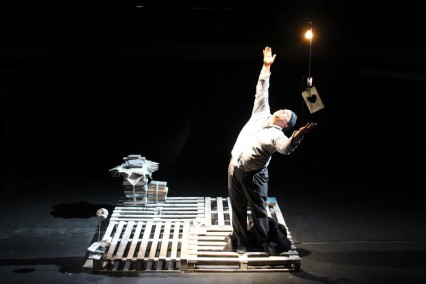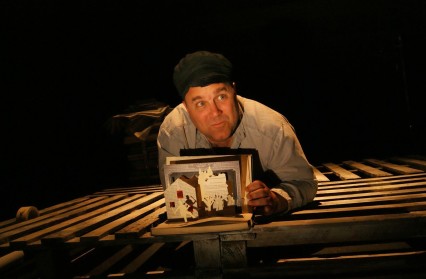Phil Morris recommends Diary of a Madman by Sinead Rushe calling its production an enthralling performance that has impressed audiences for several years.
Living Pictures at Chapter Arts Centre / Edinburgh Festival British Council Showcase
Performed by Robert Bowman
Directed by Sinead Rushe
Living Pictures’ adaptation of Gogol’s Diary of a Madman is a small-scale one-man-show that has toured studio theatres across Wales and beyond, yet in terms of its emotional heft and compelling storytelling it is a major theatrical event. Robert Bowman deservedly won the Best Actor in an English Language Production prize at the 2014 Wales Theatre Critics’ Awards for his riveting portrayal of Poprishchin – a low-ranking civil servant whose descent into madness is chronicled in a series of blackly-comic diary entries. The production returned to Chapter for previews this August, before heading off to Edinburgh, where it will be part of a British Council showcase of Welsh theatrical talent. With actor and role having spent several years together, Bowman’s chilling portrait of psychological decay has acquired an even greater degree of detail and spontaneity.

Poprishchin channels his petty work-place frustrations, deep-seated loneliness and repressed sexual yearnings for a beautiful General’s daughter into a pathetic daily record of banal observations, which slowly take on an increasing strangeness. He hallucinates conversations with a dog and obsessively stalks the object of his futile infatuation. Critics first praised Gogol’s short story as an allegorical satire on the incompetent bureaucracy of the regressive regime of Tsar Nicholas I. Poprishschin can also be regarded as a comic precursor to Dostoyevsky’s unnamed ‘Underground Man’ – an ordinary citizen attempting to assert his individuality against the multitudes of the modern city. Arguably, Gogol’s greatest achievement in Diary of a Madman is the profound psychological insight with which he renders Poprishchin’s slide into what appears to be either schizophrenia or hypermanic psychosis.
Bowman’s sensitive reading of Gogol’s text is the foundation of a complex, vivid and utterly heartrending performance. The portrait is lightly sketched in at first – a lot of fun is had with Poprishchin’s imagined conversations with a talking dog, nonsensical non-sequiturs and grandiose personal ambitions. While the production runs at around seventy minutes in length, the journey from wistful melancholic isolation to hideous psychotic breakdown is given tremendous size and humanity by Bowman’s subtle shading of characterisation. Early in the play, his voice is clipped and actorly when articulating Poprishchin’s social and intellectual pretensions, it later becomes fierce and raspy as madness grips, before emerging as a reedy little whisper during ultimate incarceration in a lunatic asylum.
The closing scenes, in which an extremely ill Poprishchin – who has come to delude himself that he has somehow inherited the recently-vacated throne of Spain – recounts his mistreatment and violent abuse at the hands of the asylum staff are deeply disturbing, and sadly historically accurate. The self-deceived King of Spain mistakes his frequent beatings for a royal initiation administered by functionaries of the Inquisition, until such delusions finally dissolve in the incoherence of abject terror and pained confusion. The dark ironies of Poprishchin’s psychological collapse elicit an occasional laugh but you want to cry.
Original music for the clarinet by Roland Media effectively alludes to the story’s Russian setting, and the direction of Sinead Rushe is suitably unfussy and assured. Yet undeniably the production is distinguished by an enthralling performance that has impressed audiences for several years, and which is becoming richer and deeper with each subsequent iteration.
Diary of a Madman is playing at the ZOO Venues Aviary Theatre in Edinburgh, as part of the British Council showcase at the International Fringe Festival from 7th -30th of August.












